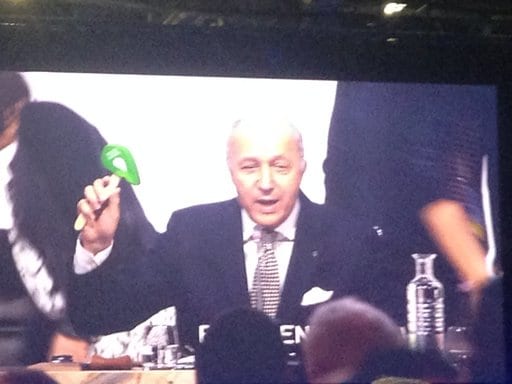The historic climate deal signed in Paris on 12 December 2015 has been embraced by many campaigners as a turning point in the fight against climate change. But energy companies should also be rejoicing. The unanimously adopted agreement provides the certainty of a long-term goal with the flexibility of carbon markets, takes a significant step towards creating a global level playing field, and promises billions in new subsidies to drive business opportunities in developing countries. Sonja van Renssen reports from Paris.
What was remarkable on Monday morning was the almost complete absence of any reaction to the Paris climate agreement from the energy sector. Many NGOs, investors, and non-energy businesses hailed a paradigm shift. The International Energy Agency (IEA) said: “The Paris Agreement is nothing less than a historic milestone for the global energy sector. It will speed up the transformation of the energy sector by accelerating investments in cleaner technologies and energy efficiency.” So where were the reactions from those actually in the energy business?
The Paris Agreement takes a step towards another important business demand: a global level playing field
Prior to the UN climate conference also known as COP21 in Paris, ten oil and gas companies issued a statement declaring their support for a 2 degrees future. But as this openDemocracyUK article argues, they are struggling to explain to themselves and shareholders how they will retain their value in a decarbonised world. At the same time, European utilities are struggling to generate revenues in markets with a growing share of renewables. The energy system in Europe and elsewhere is undergoing great change. What the Paris Agreement does, is provide a clear direction of travel. The energy sector can use this to its advantage.
Finally, long-term certainty
The Paris Agreement commits the world to decarbonisation. Sure, there is no mention of “fossil fuels” or “renewables” or “energy efficiency” or even “carbon” or “energy”, but the wording is unequivocal: world governments aim to limit global temperature rise to “well below 2 degrees Celsius” and “pursue efforts” to keep it to 1.5 degrees. They also agree to reach “global peaking” of greenhouse gas emissions “as soon as possible” and to achieve “a balance between anthropogenic emissions by sources and removals by sinks” in “the second half of this century”.
Miguel Arias Cañete suggested that revisiting climate targets would be a task for the next Commission
It sounds complicated, but the “balance” phrase is basically science-speak for the “emissions neutrality” of an earlier draft. Expert Michael Jacobs, former advisor to ex-UK Prime Minister Gordon Brown and now representing the New Climate Economy project, said the final language is stronger because it can be directly sourced to the International Panel on Climate Change (IPCC). It means “net zero emissions”, he added.
The difference with “decarbonisation” is that the new formulation does not require emissions to stop, but rather suggests that we can emit and then absorb, for example through forests and wetlands (see Monday’s article “Paris emission cuts aren’t enough – we’ll have to put carbon back in the ground”). Scientists in Paris stressed however, the importance of fully phasing out CO2 emissions. Hans Joachim Schellnhuber, Director of the Potsdam Institute for Climate Research (PIK) said: “To stabilise our climate, CO2 emissions have to peak well before 2030 and should be eliminated as soon as possible after 2050. Technologies such as bio-energy and carbon capture and storage as well as afforestation can play a role to compensate for residual emissions, but cutting CO2 is key.”
Level playing field
Businesses have always asked policymakers to provide them with a clear, long-term framework. The Paris Agreement provides that framework. Of course it needs to be implemented, but let’s be clear: the Agreement is legally binding. It is not – as IFIEC, representing energy-intensive industries – said on Monday “more a non-binding declaration of intention”.
Goldman Sachs announced a quadrupling of its clean energy technology budget to €150 billion by 2025
The word “shall” – indicative of legal requirement – features aplenty, including in requiring all parties to “prepare, communicate and maintain” successive national climate action plans (INDCs) and to pursue domestic mitigation measures. The national plans “will” represent a “progression” in ambition over time and updated INDCs must be communicated every five years.
In a last-minute change, one “shall” did change to “should”: “developed country parties “should” continue taking the lead by undertaking economy-wide absolute emission reduction targets”. This was necessary to ensure US congress would not block the deal. In other places, including on financing, it is clear that developed countries are in the hot seat for now. The change may gain in significance as the years pass, however, as it ushers in a truly universal approach to climate action.

The Paris Agreement therefore takes a step towards another important business demand: a global level playing field. It clearly reflects a choice to go for a single approach with flexibility within that for less developed countries, rather than two separate approaches for developed and developing countries. This holds true for everything from mitigation and adaptation to financing and transparency. How to enshrine differentiation was one of the central issues to resolve in the final hours. Monica Araya, a former lead climate negotiator for Costa Rica and today Founder of Nivela, said the break with the past is dramatic: the reference to developing parties providing financial support to other developing countries would have been “unthinkable” before.
Yet BusinessEurope, much as IFIEC, played down progress on this front. “The EU remains by far the most ambitious,” it said in a press release. “As long as the EU is doing a solo run, our competitiveness remains at risk.” This is presumably to pre-empt calls for Europe to raise its greenhouse gas emission reduction targets and further tighten its EU ETS.
In future, any country could generate a carbon credit and sell it
Green MEP Bas Eickhout, shadow rapporteur on EU ETS reform, lost no time in doing exactly this on Saturday: “The implications of this agreement for Europe are clear: the EU needs to reassess its climate and energy targets for 2020 and 2030. The EU has promised to increase its 2020 greenhouse gas reduction target to 30% if there is global action on climate change; this condition has now been met.” EU climate and energy commissioner Miguel Arias Cañete however, suggested on Monday that revisiting climate targets would be a task for the next Commission with an updated INDC not due until 2020, according to a COP decision accompanying the Paris Agreement.
Trillions of opportunities
For businesses looking for a leg-up into the cleantech economy, the Paris Agreement – and all the initiatives springing up around it – could trigger a tidal wave of investments. “This historic agreement sends a spark, a signal, that the low-carbon global economy has officially arrived,” said Mindy Lubber, president of Ceres and director of the Investor Network on Climate Risk, which consists of 115 institutional investors collectively managing $13 trillion in assets. “Given the global reach of the agreement and the follow-up mechanisms and transparency behind it, I’m hopeful we could see trillions – not just billions – pouring into the low-carbon economy worldwide every year.”
“The need for the financial markets to fund the clean energy transition creates unparalleled opportunity for growth on a scale not seen since the industrial revolution,” agreed Anthony Hobley from the Carbon Tracker Initiative. Vehicles for green investments are feeding off the Paris Agreement. The Climate Bonds Initiative welcomed it as a “tremendous result” and Goldman Sachs announced a quadrupling of its clean energy technology budget to €150 billion by 2025. These are just a few of many examples.
“Fossil fuel companies must accept that they are an ex-growth stock and urgently re-assess their business plans”
Carbon pricing is another win for business in the deal. Carbon market advocates including electricity association Eurelectric, welcomed language that set outs “a clear role for market mechanisms” going forward. The foundations are there to trade greenhouse gas emission reduction units across borders in future, by linking up existing carbon markets for example, and for a new CDM-like crediting mechanism. In a break with the past, the latter is not limited to developing countries. In other words, in future, any country could generate a carbon credit and sell it. All of this opens up the door to more cost-effective emission reductions, argue groups like the International Emission Trading Association (IETA).
Even NGOs like Carbon Market Watch are happy however, with a clear reference to robust accounting rules that would explicitly avoid double counting of emission reductions. These rules, and the modalities of trading, are to be worked out at future climate conferences.
Time for change
Stakeholders from scientists to investors believe that the Paris Agreement spells the end of the fossil fuel era. Energy companies upstream and downstream will have to change. As Hobley put it: “Fossil fuel companies must accept that they are an ex-growth stock and urgently re-assess their business plans.”
But this implies opportunities as well, notably in emerging markets. European utilities such as E.ON have already started expanding into renewable energy. Engineering giants like Siemens and GE see billions in infrastructure opportunities. The big question now is what oil and gas companies will do.
The big question now is what oil and gas companies will do
With enormous flows of finance foreseen from the developed to the developing world for the foreseeable future, climate mitigation could become a very interesting private sector opportunity. The Western world – and its energy sector – is off the hook in the final Paris agreement with no mention of “liability” or “compensation” for loss and damage from irreversible climate change. Indeed the accompanying COP decision explicitly says that the Agreement “does not involve or provide a basis for any liability or compensation”. But as Kumi Naidoo of Greenpeace said, the push for litigation does not stop here. Energy companies would do well to look to the future.
Source: Energy Post. Reproduced with permission.










